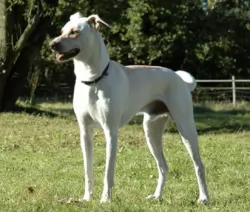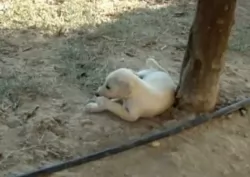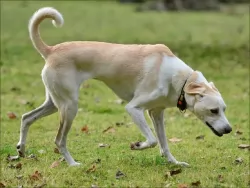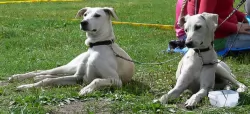 MyDogBreeds
MyDogBreeds Ibizan Hound is originated from Spain but Cretan Hound is originated from Greece. Ibizan Hound may grow 6 cm / 3 inches higher than Cretan Hound. Both Ibizan Hound and Cretan Hound are having almost same weight. Both Ibizan Hound and Cretan Hound has almost same life span. Ibizan Hound may have more litter size than Cretan Hound. Ibizan Hound requires Low maintenance. But Cretan Hound requires Moderate maintenance
Ibizan Hound is originated from Spain but Cretan Hound is originated from Greece. Ibizan Hound may grow 6 cm / 3 inches higher than Cretan Hound. Both Ibizan Hound and Cretan Hound are having almost same weight. Both Ibizan Hound and Cretan Hound has almost same life span. Ibizan Hound may have more litter size than Cretan Hound. Ibizan Hound requires Low maintenance. But Cretan Hound requires Moderate maintenance
 This lean, speedy and agile hound dog looks and acts very much like a Pharaoh Hound except the Ibizan Hound is larger and a different color. The image of dogs that look like the Ibizan have been seen since 3400 BC in Egypt. The dogs were probably brought by sailors to Ibiza and surrounding islands. They came about 700-900 BC. It is believed that they actually came for the island of Elvissa and Spain, where they speak Catalan. It was also known in France as the le chanigue. There job was the same. To hunt rabbits.
This lean, speedy and agile hound dog looks and acts very much like a Pharaoh Hound except the Ibizan Hound is larger and a different color. The image of dogs that look like the Ibizan have been seen since 3400 BC in Egypt. The dogs were probably brought by sailors to Ibiza and surrounding islands. They came about 700-900 BC. It is believed that they actually came for the island of Elvissa and Spain, where they speak Catalan. It was also known in France as the le chanigue. There job was the same. To hunt rabbits.
They were fast hunting greyhound type dogs. They hunted for rabbit for the Ibizaners and themselves. These dogs hunt by day and by night. They are not just sight hounds, they also hunt by smell and hearing, in packs or by themselves. They use their sight to find and corner the prey. Then they act like retrievers and bring it back to the hunter. Their function and look is very similar to several other dogs such as the Pharaoh Hound, the Greyhound, the Portuguese Podengo, the Cimeco dellEtna and the Podence Canario. The Ibizan is larger than any of these, but all these breeds are considered to be “primitive”.
Within the breed itself there are smooth, wire and longhaired Ibizan Hounds. The Smooth is by far the most common. A great jumper, nimble runner built for stamina, the Ibizan Hound was just what the island people needed. The breed lived in isolation on the island for many centuries, under a variety of rulers including the Romans, Egyptians, Vandals, Carthaginians, Chaldeans, Arabs and Spanish. Because of the harsh island conditions, the farmers only allowed the best hunters among the Ibizan Hounds to procreate thus assuring a breed that is unchanged from ancient stock.
By 1950 the Ibizan Hound was brought to America. Because this dog is not a pet but a working machine, it took awhile for the breed to become popular enough to be recognized by the American Kennel Club (AKC) in 1979. Still the Ibizan Hound is a rare breed with the female being a better hunter than the male. One of the most common activities of this breed in the U.S. is lure coursing. These events are sponsored by AKC and ASFA as well as racing events in the NOTRA and LGRA.
 Although the Cretan Hound or the Kritikos Lagonikos is recognized in both Greece and Germany, the hunting dog breed is from the island of Crete, Greece. The dog’s history goes back thousands of years. It is an ancient breed and some believe it is one of the oldest hunting breeds in Europe.
Although the Cretan Hound or the Kritikos Lagonikos is recognized in both Greece and Germany, the hunting dog breed is from the island of Crete, Greece. The dog’s history goes back thousands of years. It is an ancient breed and some believe it is one of the oldest hunting breeds in Europe.
The Cretan Hound has been bred as a working dog, combining sight and scent to track down their prey. Today it is still a rare dog breed that you won’t easily find outside of Crete.
Greece kennels recognize this dog as well as some European kennels, but it isn’t recognized by the American Kennel Club.
 The breed is agile, elegant, athletic and graceful. At the same time the Ibizan Hound is a fierce hunter travelling at unreal speeds to catch his rabbit prey. They are a hardy breed with a lean and long neck, and a lean, muscled body with laid back shoulders. The ears are specific to the breed, with a broad base leading to long, beautiful ears. They have tan eye rims, nose, foot pads, and ears. The eyes themselves are an amber with an intelligent and alert expression.
The breed is agile, elegant, athletic and graceful. At the same time the Ibizan Hound is a fierce hunter travelling at unreal speeds to catch his rabbit prey. They are a hardy breed with a lean and long neck, and a lean, muscled body with laid back shoulders. The ears are specific to the breed, with a broad base leading to long, beautiful ears. They have tan eye rims, nose, foot pads, and ears. The eyes themselves are an amber with an intelligent and alert expression.
 Known for its extraordinary scent abilities as well as its speed, this dog has always been used as a hare hunter because of these skills.
Known for its extraordinary scent abilities as well as its speed, this dog has always been used as a hare hunter because of these skills.
It’s a slender dog of medium to large size and stands at about 60-68cm in height and weighs between 20 – 30kg. It is lean, strong, muscular and swift with a body that is inclined to be longer than tall.
He is slightly heavier than other scenthounds and his ribs aren’t seen. The head is wedge-shaped and the ears drop down, are folded back or can be semi-erect. The eyes are dark and the tail is long and curves upwards with longer hair being found on the tail.
The coat is short and smooth, and coat colors of the dog are varied and can be fawn, sandy, grey, white, black or brindle, and it can be tri-colored too.
The Cretan Hound is alert to sight, sound and scent and when it senses prey, the tail moves in a circular way and the dog becomes rigid for a while before he is off on the hunt.
He is a gentle, intelligent dog, reserved around strangers but making an excellent family pet as he gets on well with all his human family members as well as pets in the house. With good training and socialization, the dog becomes more relaxed around strangers.
He isn’t an aggressive dog, and while he is alert to sounds and smells, he doesn’t make a particularly good watchdog.
 They love children but be careful they do not knock them over and don’t let the children play to rough.
They love children but be careful they do not knock them over and don’t let the children play to rough.
Exceptional jumping ability, speed and stamina.
Must have a large fenced yard and a place to run full out.
Very intelligent with excellent learning ability.
 The Cretan Hound is an energetic, curious dog, but when it comes to being a family pet, he is affectionate and gentle.
The Cretan Hound is an energetic, curious dog, but when it comes to being a family pet, he is affectionate and gentle.
He is a reserved dog around strangers. He likes to be busy and will love his walks and games with his human family members. He is smart so is readily trained and he likes to be obedient and to please.
The Cretan Hound will live in harmony with other dogs in the home and they’re also patient and good around disciplined children who have learned to respect animals.
Provide your Cretan Hound with his fair share of love and attention and he will go out of his way to be a loyal and loving family friend.
 Despite being isolated on the islands for all those years, the Ibizan Hound has several tendencies toward medical issues:
Despite being isolated on the islands for all those years, the Ibizan Hound has several tendencies toward medical issues:
 The Cretan Hound is a healthy, robust dog breed, but even so, he can suffer from some common health problems that other dogs are also susceptible to. Some of these are hip dysplasia , cancer, ear infections, bloat and cherry eye.
The Cretan Hound is a healthy, robust dog breed, but even so, he can suffer from some common health problems that other dogs are also susceptible to. Some of these are hip dysplasia , cancer, ear infections, bloat and cherry eye.
Remember that if you don’t want your dog to have puppies, they can actually benefit health-wise from being spayed or neutered. Doing this for your pet can prevent a number of health issues later on down the line.
Make sure too, that your puppy receives his vaccinations in a timely fashion so as to avoid terrible, life threatening illnesses such as parvo and rabies.
 Your Ibizan Hound is an athlete and needs to be fed like one. As a puppy he needs high quality breed or group (hound) specific food. Feed her 3-4 times a day based on calories. A puppy needs about 866 calories each day.
Your Ibizan Hound is an athlete and needs to be fed like one. As a puppy he needs high quality breed or group (hound) specific food. Feed her 3-4 times a day based on calories. A puppy needs about 866 calories each day.
If your dog participates in sports as adults, they need between 1450 and 2900 calories each day. The exact amount depends on how much activity the dog is engaged in. Feed at least 2 times a day.
Great speed and stamina
Your Ibizan Hound is a working athlete. He needs a lot of exercise and he needs a chance to run full out so access to land is essential. It can be a large back yard, or it can be a dog park. No matter what it is, it is essential for the Ibizan Hound. She will also require long walks at least a couple times a day. However, do not over exercise your puppy. They are great jumpers as well as runners.
The sport of lure coursing was made for the Ibizan in the same way that it was made for the Greyhound. They are good at Flyball and agility as well.
 You’re certainly not going to have to do too much grooming with the Cretan Hound as he is a low maintenance breed.
You’re certainly not going to have to do too much grooming with the Cretan Hound as he is a low maintenance breed.
The dog is a short haired breed and an average shedder, so a good brush twice a week will keep the coat free of loose hairs and maintain the condition of the hair.
As with all dogs, the nails as well as the ears must be checked and attended to. The veterinarian can advise you on how to keep his ears clean and free of infection, as prodding around without knowing can damage his ears.
This Cretan Hound has high activity needs. He is energetic and also hard-working, and you’ll need to be taking him on long walks and providing him with some highly energetic playing sessions. Throw ball for him and take him with you when you go jogging or cycling.